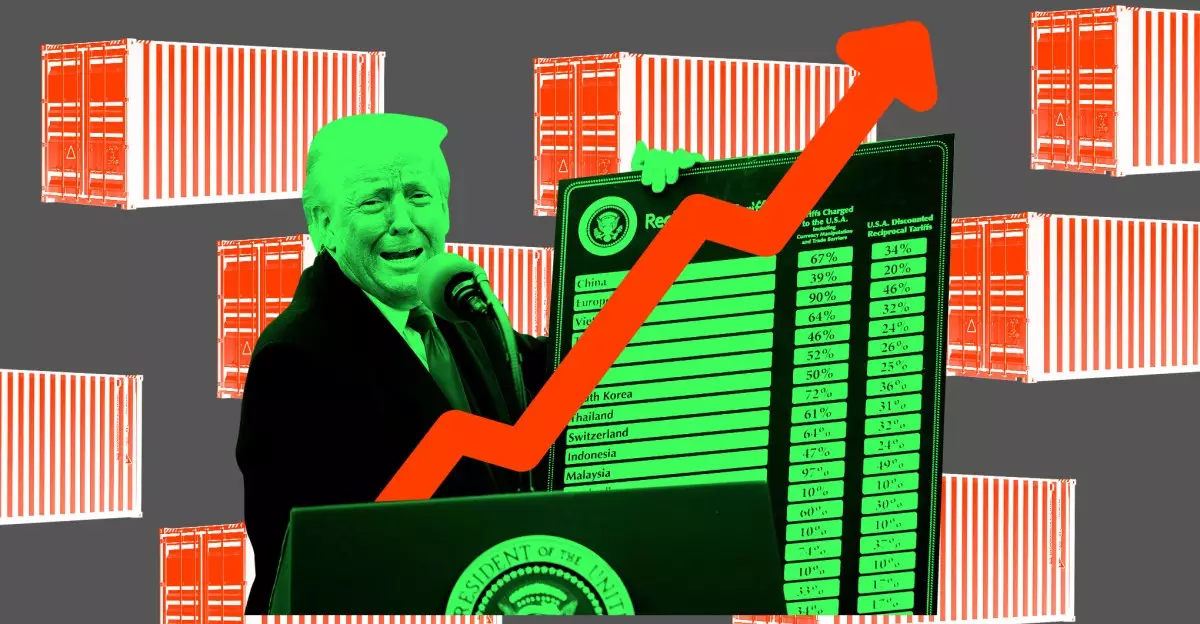In the complex interplay between technology and governance, the stakes for major players like Meta, Apple, and Tesla have become alarmingly high. Once revered for their innovation and market potential, these giants are now being utilized as pawns in a broader geopolitical chess game. Under the administration of President Donald Trump, there was a glimmer of hope among tech executives, who believed they had an ally in the White House. Fast forward to the present, and it’s evident that the prosperity of the tech sector may have become collateral damage in a series of escalating trade conflicts.
The current realities facing tech companies are stark. As the U.S. finds itself in heated negotiations with the European Union regarding various trade tariffs, the European Commission has hinted at implementing measures that would target the advertising revenues of digital services. This is alarming news for CEOs, especially those like Mark Zuckerberg, who believed that Trump’s leadership would create a more favorable environment for their enterprises. Instead, they find themselves navigating a landscape fraught with uncertainty and potential penalties, particularly as Meta and Apple are set to face fines for breaching the EU’s Digital Markets Act.
The Unraveling of Trust: Musk and Tesla’s Woes
One cannot overlook how personal convictions can ripple through the corporate world, particularly illustrated by Elon Musk’s shifting stances amid increasing tensions. Although Musk’s alignment with Trump could have potentially galvanised support, it appears to have inversely affected Tesla’s stock, which has plummeted more than a third this year. This dip is compounded by rising tariffs that have thwarted Tesla’s ability to sell new vehicles manufactured in the U.S. to Chinese consumers, presenting a catastrophic conundrum for one of the most innovative car manufacturers in the world.
Critics might argue, however, that the real issue could lie in Musk’s polarizing social and political presence, which undoubtedly plays a significant role in public perception and consequently, stock performance. As trends shift and consumer moods fluctuate in this volatile market, it remains to be seen whether Musk can navigate the storm brewing on multiple fronts, including corporate strategy and diplomatic relations.
The Fragility of TikTok: Caught Between Superpowers
Among the myriad challenges facing tech companies, TikTok embodies the precarious situation of a business that thrives on cultural connectivity yet finds itself at odds with national interests. The platform is particularly vulnerable to U.S.-China tensions, which have reached a fever pitch due to tariffs and regulation discussions. Statements from China’s commerce ministry reflect a growing discontent with the U.S.’s approach, where they mentioned “plunder by force” and vowed to defend their companies’ interests vigorously.
If the stakes couldn’t be higher, the prolonged negotiations regarding a potential sale of TikTok to a U.S. entity further complicate matters. AppLovin’s CEO recently noted that the chaotic stock market landscape dilutes feedback from shareholders, indicating that broader economic issues are obscuring the potential future of one of the world’s most popular social media platforms. It’s a grim reminder that once secure brand giants can rapidly find themselves on shaky ground when entangled in geopolitical tension.
The Evolving Dynamics Within the Tech Sector
As the tech landscape continues to shift, industry insiders are also struggling to adapt to new realities. OpenAI is facing scrutiny not only for its alignment with traditional profit motivations but also for how the organization has transitioned from a non-profit model to a more commercially driven enterprise. This shift raises questions about ethical practices in an industry already replete with controversy, especially as critics rally to oppose this transformation.
At Google, internal upheaval is palpable as layoffs impact sectors previously thought secure. Confusion surrounding the layoffs suggests a lack of cohesive strategy within Google’s management structure, further complicating what should ideally be a straightforward downsizing process. Inconsistent treatment of workers—such as offering different severance packages—adds layers of complexity that undermine employee morale and trust in leadership.
Market Ramifications: An Industry Under Siege
What’s eminently clear is that the tech industry is no longer operating in isolation. The intertwining of political agendas and economic forces creates a battleground where companies must navigate complex regulatory landscapes while striving to remain profitable. As leading firms become bargaining chips between nations, the unpredictability of political decisions weighs heavily upon them.
As these corporate giants grapple with internal and external pressures, they must also contend with reports indicating an increased critique of AI technologies, evident in comments from key figures who express frustrations regarding regulatory hurdles. The push for transparency in AI development is gaining momentum, making it imperative for these companies to adapt—or risk losing their grip on public perception.
In the dynamic world of technology, the adage rings true: to operate successfully is to be vigilant and adaptable in the face of relentless change. The fate of these monumental companies may depend not on their innovation alone but on their ability to rise from the political and economic ashes surrounding them.

